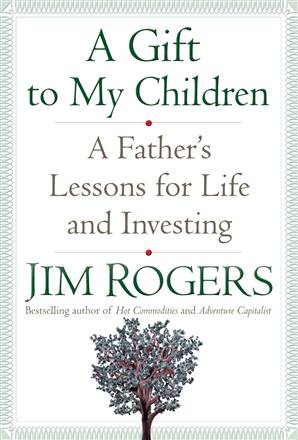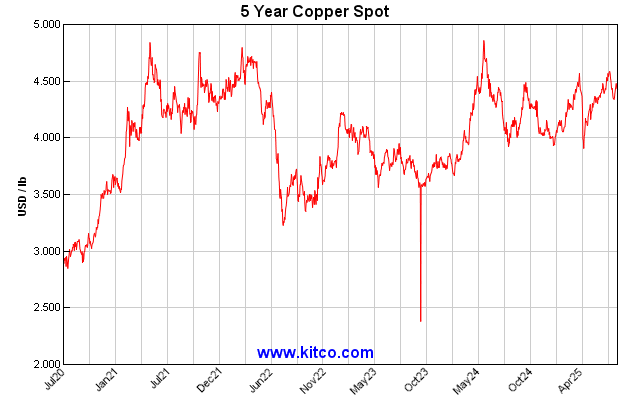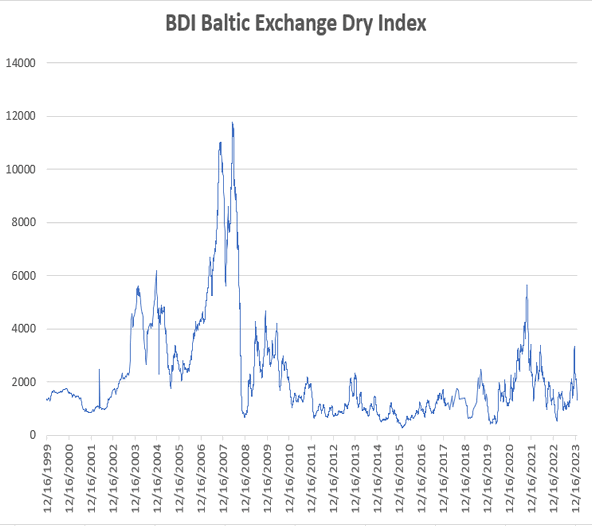Readers' Book Reviews
October 19, 2009
Jim Rogers

Background
Legendary investor Rogers cofounded the Quantum Fund with George Soros in 1970, retired at the age of 37 in 1980, and spent a number of years traveling through China and six continents by motorcycle. He has taught at Columbia University and authored many best selling books including; A Bull in China, Hot Commodities, Adventure Capitalist, & Investment Biker
Our Take
As a fan and reader of all of Jim Rogers books I was happy to pour through “A gift to my children”. I read the book in 1 hour and purchased several copies for the younger members of my family. This book is not for advanced value investors; however it is for young minds. If I had this book when I was 8 years old I would be a much wiser and smarter person today. Rogers delivers on his promise of providing gifts to younger members of society and deserves compliments for doing so. If you’re interested in cultivating a young mind and potentially rearing the next Warren Buffett this book is for you.
Keys to Success (Taken from the titles and sub headings of Each Chapter)
1. Do Not Let Others Do Your Thinking For you
2. Focus On What You Like
3. Good Habits For Life & Investing
4. Common Sense? Not So Common
5. Attention to details is what separates success from failure
6. Let the World Be A Part Of Your Perspective
7. Learn Philosophy & Learn To Think
8. Learn History
9. Learn Languages (Make sure Mandarin Is One Of Them)
10. Understand Your Weaknesses & Acknowledge Your Mistakes
11. Recognize Change & Embrace It
12. Look To The Future
13. “Lady Luck Smiles On Those Who Continue Their Efforts”
14. Remember That Nothing is Really New
15. Know when not to do anything
16. Pay attention to what everybody else neglects
17. If anybody laughs at your idea view it as a sign of potential success
Most powerful exercise from the book:
“Reflect on situations where conventional wisdom and custom turned out to be wrong. Take the time to find out what actually happened”
Favorite Quotes
“Anything that is a must see, must try, must read, should almost certainly be avoided, especially if it is popular.”
“Never act upon wishful thinking. Act without checking the facts, and chances are that you will be swept away along with the mob.”
“Learn to stay calm especially in times of pressure or turmoil. You will make much better decisions”
“Do not get married until you are at least 28 and know a bit more about yourself and the world”
“Lean to do as much arithmetic and figures as possible in your head”
Another Reader's Summary:
* Swim your own races
- do not let others do your thinking for you;
- rely on your own intelligence;
- it's important to decide for yourself what's important to you and what you want before you turn to others;
- if anyone laughs at your idea, view it as a sign of potential success;
- be who you are; be original; be bold;
- above all, be ethical;
- save ~ you must avoid the trap of spending $ willy nilly simply because you can;
* Focus on what you like
- Age is irrelevant when you are passionate about a goal;
- when you find something that interests you, just do it!
- The quickest way to success is to do what you like and give your best;
- Dedicate yourself to what you feel passionate about;
- Try as many things as you can, then pursue the one about which you're passionate;
* Good habits for life
- Be a self-starter;
- Attention to details is what separates success from failure;
- However trivial it may seem, you must research and check each and ever piece of information you need to make a decision... Only through meticulous research will you obtain the knowledge necessary for success... it requires abundant work and diligence...
- There is no such thing as "enough". No finish line!
- Live your life with a dream;
- If you continue to be passionate and work hard at what you truly love to do, you eventually find that dream;
* Uncommon Sense
- Always consider alternative interpretations;
- Seek out multiple perspectives on the same story will always help you figure out the truth;
* Your education ~ Let the world be a part of your perspective PART 1
- Do not rely on books; go and see the world;
- Experience life as they do; see the world from the ground up. By observing ordinary life... you will forever be stumbling upon experiences that will raise important question in your mind ;
- Understand the significance of BRICs;
- Be open to people who are different whether at home or abroad;
- Keep an open mind and be a world citizen;
- Be eager to move if you see opportunities;
* Your education ~ Learn philosophy and learn to think PART 2
- Philosophy will teach you how to think for yourself;
- You must learn to think at a profound level if you want to understand yourself and what's important to you. You must know yourself if you want to accomplish anything in life...;
- To think outside the established framework, to examine things independently this is true philosophy...;
- Draw conclusions from your observations as well as on the basis of logic;
- As an investor, look for the bull and the bear;
* Your education ~ Learn history PART 3
- An interest in history, politics, and economics will help you see the world with clearer perspectives;
- Nothing is really new: what is happening now has happened before and will happen again;
* Your education ~ Learn languages (make sure that Mandarin is one of them) PART 4
- Mandarin will be the next global language;
- Pay attention to the major changes taking place in the world now, especially China;
* Know thyself by understanding your weaknesses and acknowledging your mistakes
- Know who you are;
- To be a successful investor you really need to understand psychology, history, and philosophy;
* Recognise change and embrace it
- Everything changes. Everything;
- Embrace the principle of supply and demand;
- Change can be a catalyst;
- Adapt or die;
* Look to the future
- Read the newspapers, but think differently;
- Pay attention to what everyone else neglects;
- If you are looking for success, be quick to start something new, something that no one else has tried;
- The more certain something is, the less likely it is to be profitable;
- Do not think in terms of what you wish (ergo, wishful thinking versus willful doing);
- Know when not to do anything;
* Lady Luck smiles on those who continue in their efforts
- Do your homework'
- If you let vanity and self-importance (ego) take over, you will lose all that you have achieved;
- Never let yourself become arrogant. Study hard. The more you learn, the more you will realise how little you know - armed with this humility, you will never lose sight of the distance between self-confidence and self-importance;
- Do not stop when you are working towards your dream;
* Epilogue
- The devil of life is always in the details;
- Anything that is a must-see, must-try, must-read, must almost certainly be avoided, especially if it is popular;
- Use good manners no matter where you are or whom you meet;
- Learn to do as much arithmetic and figures as possible in your head;
- Take care of yourself;
- Learn to stay calm;
- Once you do get to know and understand yourself, remember who you are and stay with it;
- Don't be greedy
Another Reader's Summary:
At the age of six, in 1948, Jim started his first business. Instead of playing baseball with friends, he preferred to collect empty bottles, sell them and pick up a little cash. Then one day his father offered him to loan $100 to start his second business that was highly successful selling peanuts and drinks at little league games. After 5 years, Jim had paid off the loan and still had $100 in his bank account ($100 were a lot of money in those days.)
Jim won a scholarship to Yale University. After graduating in 1964, he found a job on wall street. In 1973, Jim co-founded the Quantum fund. During the following 10 years, the portfolio of this fund grew 4,200% while the S&P grew less than 47%. At the age of 37, in 1980, Rogers decided to retire and fulfilled his lifelong dream: an around the world motorcycle trip across six continents, the Guinness world record.
Currently he lives in Singapore with his wife and daughters. In this book he has tried to put down all the lessons at one place that he has learned in his adventurous life, for example work hard and never quit, think for yourself, always prepare for the worst, read as much as you can, learn history and philosophy and save and invest your money to live a beautiful life. He has written this book for his young daughters and for anyone seeking success.
Some of my favorite chapters from this book are following:
Swim Your Own Races
Do not follow the crowd. Many people are ready to offer you advice but only you can decide what is important to you. You were born with the ability to decide. You know it very well what is good for you and what is not. So most of the time you should follow your instinct to make right decisions. Jim Rogers says when he was new to wall street, he tended to assume that his seniors knew more than him but sooner he realized that he was wrong. He stopped allowing himself to be influenced by others.
Be Who you are
If you look at people who have been successful in their chosen field you would find out that they do not try to copy others. They all approach their work in the original ways. He advises that you should find out what you want to do in your life. May be you want to become doctor, lawyer, accountant, web developer or investor. You should do what you want as long as you do not violate the rules and laws of society.
Save money
You are living in consumerism age. Every year new technological products are coming out in the market. You feel pressured to spend all the money you are earning. But you should avoid this trap of spending money. You should try to save money. Before buying anything you should ask yourself is this really worthwhile. Jim Rogers was once married to a woman who wanted to spend all they were earning but Jim wanted to save and invest money so that later in their life they could buy anything they want without being dependent on social security. They did not stay married too long.
Do what you love to do
Many people find it difficult to figure out what they really love to do. Here is the solution, try as many things as you can and eventually you will find the thing, you love to do the most. Jim Rogers became successful because he found out early in his career that he enjoys the investing most. The least happy people are those who are stuck in the jobs they don’t love.
Work hard
If can find out what you love to do, you would surely work harder in that field than other people. You would naturally would do that job in the best way you can do. Jim Rogers says that when he was studying in the Yale University, most of his classmates were better prepared than he was. But his advantage was that he was willing to work much harder than they did. The same strategy he applied to his investing career. He read all the books, he could find on investing. He read several annual reports of companies to find the winning investments.
Go see the world
To become successful in your life, you must expand your perspective toward life and world. You need to know yourself to become successful. You need to find out what advantages do you have that other people do not have and how you can make most of your advantages. To find out more about yourself and your advantages, you need to travel around the world and see how other people are living.
According to Jim Rogers, China, India, Russia and Brazil are destined to be the world’s leading economies by the year 2050. You need to acquire information to take full advantage of the investment opportunities in these growing economies.
Keep an open Mind and Be a World citizen
Jim Rogers have travelled around the world and he has found out that no matter where you live, we all want the same things out of our lives. We all want to become successful. We must keep an open mind and we need to see ourselves as the citizen of this world. We should treat others well who are different. Do not follow people who want wars. Break the chains and live away from the wars. War has never been good for any nation.
Learn Philosophy; Learn How to Think
As we have said before that if you want to become successful, you must figure out what you want to do in your life. What is the purpose of your life. What are your strengths and weaknesses. If you want to know all these things, you must learn philosophy. It will help you to think at profound level to understand yourself. It will also train you to examine every concept and every fact of your life.
Learn History
Jim Rogers says that if you want to become a good investor, you must learn the history of different countries of this world. Thus you will understand how the world works. He says what is happening now has happened before. History repeats itself. If you were smart in 1807 you moved to London, if you were smart in 1907 you moved to New York and if you are smart in 2007 you move to Asia. Studying history will help you to learn how to analyze trends and how to anticipate the future.
Spain dominated the sixteen century, France was most powerful nation in 17th and 18th century, the 19th century was the century of Great Britain. In 20th century, the United States was the super power. Now 21st century is the century of China. Jim Rogers sold his mansion in New York and moved to Singapore so that his daughters can learn Mandarin and prepare for the 21st century that belongs to China. He thinks English and Mandarin will be the two most powerful languages of 21st century.
Buy Chinese Stocks
Jim Rogers says that if you want to make money in 21st century, you must invest your money in Chinese stocks and commodities. Jim says that he owns two or three dozens Chinese stocks. He likes to invest money in stocks during bear market. He advises you that if you decide to buy Chinese stocks then you should wait for the bear market. As soon as you hear in the news that Chinese stocks and real estate prices have fallen more than 20%, consider it as the best opportunity to start buying Chinese stocks.
Final Thoughts on This book
This is a short and easy to read book in which Jim Rogers has assembled some unique ideas about life and investing. He says that everything changes and we need to learn to adjust our lives according to the changing world. I highly recommend you to read this short book to learn some valuable lessons from the life of legendary investor, Jim Rogers.
border=2 >
border=2 >
border=2 >
border=2 >
border=2 >
border=2 >
border=2 >
border=2 >
border=2 >
border=2 >
border=2 >
border=2 >
border=2 >
border=2 >
border=2 >
border=2 >
border=2 >
border=2 >
border=2 >
border=2 >
border=2 >
border=2 >
border=2 >
border=2 >
border=2 >
border=2 >
border=2 >
border=2 >
border=2 >
border=2 >
border=2 >
border=2 >
border=2 >
border=2 >
border=2 >
border=2 >
border=2 >
border=2 >
border=2 >
border=2 >









